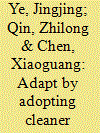|
|
|
Sort Order |
|
|
|
Items / Page
|
|
|
|
|
|
|
| Srl | Item |
| 1 |
ID:
182732


|
|
|
|
|
| Summary/Abstract |
We study how a low-emission zone (LEZ) policy affects air pollution in Nanchang, a medium-sized city located in southeastern China. By using a regression discontinuity design approach, we find that the LEZ policy improves Nanchang's air quality throughout restricted/unrestricted hours and within/outside of the designated LEZ areas. Air quality began to improve during the announcement period and improved further after the policy was enforced. These findings suggest that drivers could adapt to the foreseen LEZ policy by upgrading their vehicles; thus, to achieve policy effectiveness, it is important to make driving regulations compatible with drivers' incentives.
|
|
|
|
|
|
|
|
|
|
|
|
|
|
|
|
| 2 |
ID:
112298


|
|
|
|
|
| Publication |
2012.
|
| Summary/Abstract |
The processing costs of US corn ethanol have declined by 45% since 1983 as production volumes have increased seventeen-fold. We investigate the role of various factors that could explain this, including economies of scale, cumulative experience, induced innovation in response to rising input prices, an autonomous technological change, and trade induced competition from imported ethanol. Using data on dry-mill ethanol processing costs over the 1983-2005 period, we find evidence to show that US corn ethanol production exhibited decreasing returns to scale, that learning by doing played an important role in reducing these processing costs with a learning rate of 0.25, and that sugarcane ethanol imports contributed to making the corn ethanol industry more competitive. Other factors such as the rising prices of energy and labor did induce lower processing costs, but the effect is not statistically significant. The inclusion of these competing explanations for the reduction in processing costs of US corn ethanol lead to a significantly higher learning rate than otherwise, and this learning rate is found to be robust across specifications.
|
|
|
|
|
|
|
|
|
|
|
|
|
|
|
|
| 3 |
ID:
150425


|
|
|
|
|
| Summary/Abstract |
We use a mathematical programming model to examine the impacts of simultaneous implementation of two US biofuel and bioenergy policies on commodity markets and spatial distribution of future cellulosic biorefineries. The key findings based on our numerical simulation are: (1) the number and average annual production capacity of cellulosic biofuel refineries depend on the total renewable fuels mandate; (2) the mix of cellulosic biomass feedstock depends on the assumptions about the production costs of energy crops and the amount of cropland that can be used for energy crops, but regardless of the assumptions crop residues are the primary biomass source to meet the demand for biomass for biofuel production and electricity generation; and (3) the biomass production areas would surround either future cellulosic biorefineries or the existing coal-based power plants to reduce the costs of biomass transportation. These findings have important implications for biorefinery investors and provide valuable policy insights for the selection of Biomass Crop Assistance Program project areas.
|
|
|
|
|
|
|
|
|
|
|
|
|
|
|
|
| 4 |
ID:
121261


|
|
|
|
|
| Publication |
2013.
|
| Summary/Abstract |
This paper examines the economic and GHG implications of stacking a low carbon fuel standard (LCFS) with and without a carbon price policy on the Renewable Fuel Standard (RFS). We compare the performance of various policy combinations for food and fuel prices, fuel mix and fuel consumption. We also analyze the economic costs and benefits of alternative policy combinations and their distributional effects for consumers and producers in the transportation and agricultural sector in the US. Using a dynamic, multi-market, partial equilibrium model of the transportation and agricultural sectors, we find that combining the RFS with an LCFS policy leads to a reduction in first generation biofuels and an increase in second generation biofuels compared to the RFS alone. This policy combination also achieves greater reduction in GHG emissions even after considering offsetting market mediated effects. Imposition of a carbon price with the RFS and LCFS policy primarily induces fuel conservation and achieves larger GHG emissions reduction compared to the other policy scenarios. All these policy combinations lead to higher net economic benefits for the transportation and agricultural sectors relative to the no policy baseline because they improve the terms of trade for US.
|
|
|
|
|
|
|
|
|
|
|
|
|
|
|
|
|
|
|
|
|